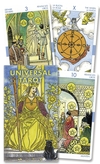The Ultimate Guide to the Rider Waite Tarot: An Accessible Guide to Tarot
Anyone who wishes to learn tarot can find a plethora of books on the subject. Anyone wishing to study the Rider Waite Tarot in depth can also find many, many books to choose from. Many of these books have similar content (although some have more than others). When deciding what book to select, especially when the content is similar, the presentation of the material is often the key factor. And it is the presentation of information that really sets The Ultimate Guide to the Rider Waite Tarot apart from others.
To begin, the authors present general tarot information in the form of lists. Making lists, especially (as these authors do) lists focusing on the top ten items in a category, forces the list-maker to think about their material concisely and to prioritize it. Reading lists is quick way to get a clear overview of a topic. Some of the lists included in this book are:
- 10 Favorite Ways of Using a Single Card
- 10 Useful Tips for Interpretation
- The 10 Most Important Interpretations for the Cups (there are lists for each of the suits)
Do not assume that because lists are quick and simple to read that they lack depth. For example, in the "10 Most Important Rules for Interpretation" list, the first one is:
The Cards are Mirrors
The cards are like the "mirror, mirror, on the wall;" they help us to see and understand ourselves better. But of course they do not in themselves carry a guarantee that their user will always draw the correct conclusions. If you stand in front of your mirror at home and say "I'm the greatest, most beautiful, etc." or "I'm the stupidest, most ugly of all, etc.," the worst-case scenario is that you will be right all the time! In that case you needn't expect the mirror to start talking to you and correct your rather one-sided opinion of yourself.
But tarot cards are a set of tried and tested tools that can help us to become aware of misleading, arbitrary beliefs. … There are many ways of expanding our perspectives with the tarot, and when we apply these new insights in our everyday lives, we find new solutions appearing as if from nowhere.
In the aforementioned "10 Useful Tips for Interpretation" list, there are tips about things to pay attention to, such as proportions, lack of human figures, or the state of the sky or background. The lists for the suits include information such as the elemental association, a concrete message, a practical message, key terms, psychological functions, associations, and mottos. In the back of the book are the authors' picks for the Top 10 Spreads, most of which are basic and general enough to apply to almost any question.
Just the lists alone provide plenty of useful information. But, the heart of the book is made up of the pages on the cards. Each card is studied in-depth and includes a color illustration of the whole card plus ten smaller illustrations highlighting specific symbols in the card. In addition to the individual symbols, we get information on the basic meaning, the spiritual experience, how to use the card as a "card of the day," what the card means as a prognosis, what it means in love and relationships, and what it means for success and happiness.
The best way to see the value of this book is to see the two-page spread of card.

The image here gives you an idea of the page layouts. This may be too small to read, so I'll pull out an example. One of the more intriguing but subtle symbols in the 9 of Pentacles is the snail in the lower left-hand corner of the image. You will see that a black line comes out from the image to the side with a small circle with the number "2" in it. This lets you know that it is analyzed on the left page.
Looking there, we read:
The Snail
Positive: the snail feels at home everywhere. It can always find somewhere to withdraw. It is independent of others, has its own rhythm.
Negative: a painfully slow pace, escape from reality, lack of involvement.
Imagine the Top 10 Symbols for each and every tarot card revealed and interpreted in such a clear, easy to read manner. For the beginner, this gives a great introduction to the cards. For even more seasoned readers, we know that every time we look at the cards, we see something new. This book is a quick and concise reference for those symbolic touches that may have eluded us in the past. For example, it was years before I realized that the man in the 7 of Wands was wearing one shoe and one boot. What does it mean? You'll have to get the book to find out!

About Barbara Moore
Related Products


is subject to certain Terms and Conditions